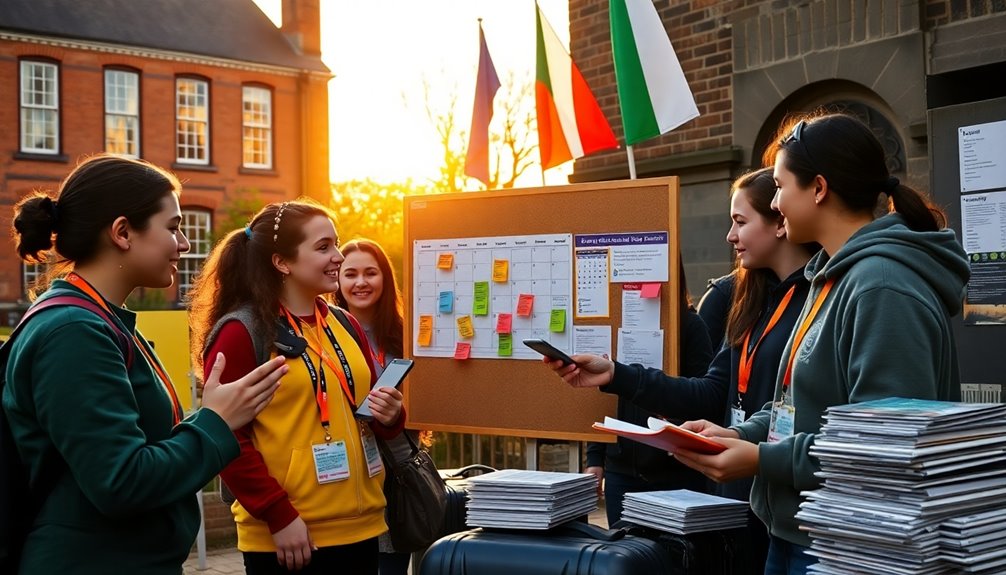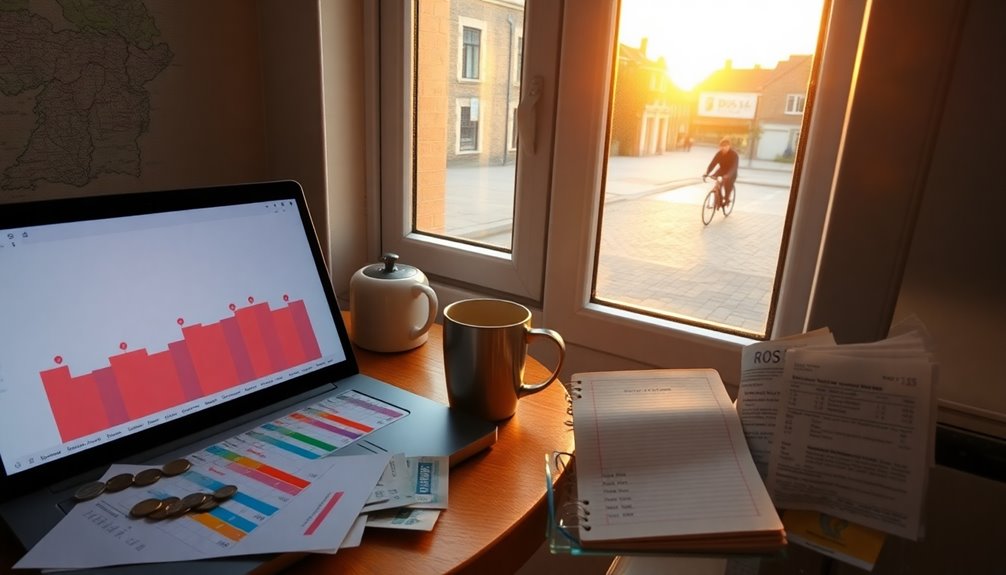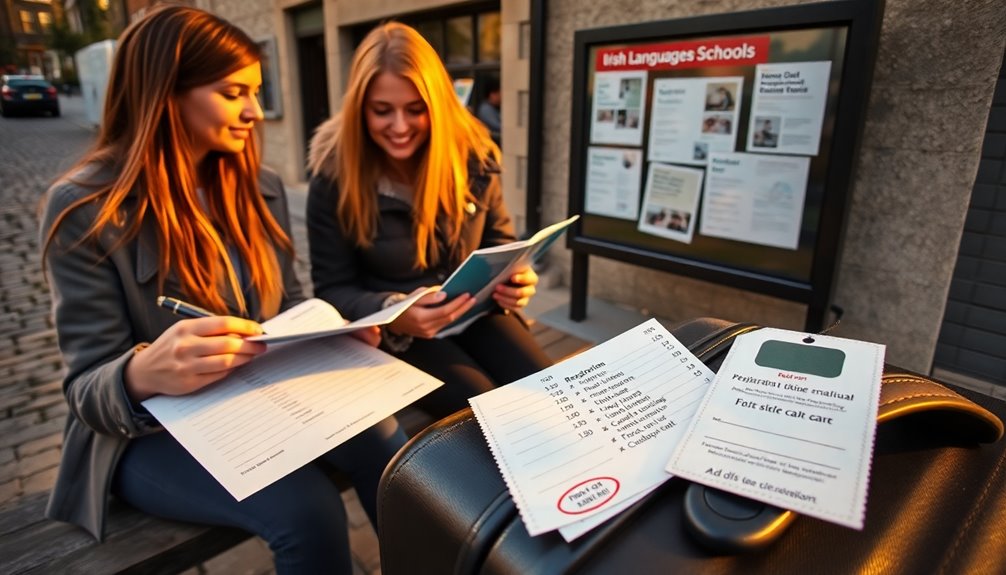
Ireland is a great, cost-effective choice for summer language study in 2026 — you’ll find weekly tuition from about €150–€350, smaller towns offering lower rates, and compact schools with small classes for faster progress. Choose homestays or shared flats to cut accommodation costs and use local buses or bikes for transport. Look for early-bird deals, group discounts, and package rates to save more. Keep an eye out for extra fees, and if you want specifics, I’ll outline practical budgets and tips.
Highlights
- Weekly tuition in 2026 ranges roughly €150–€350, with smaller towns offering the lowest rates.
- Look for multiweek packages, group discounts (5–10 people), and early-bird deposits to lower costs.
- Homestays and shared flats are cheapest for immersion; expect €100–€300 weekly depending on type.
- Small-class formats and summer intensive courses accelerate progress, giving better value per hour.
- Budget for hidden fees (materials, registration, insurance) and consider community scholarships or grants.
Why Ireland Is a Cost-Effective Choice for Summer Language Study
Because living costs, tuition rates, and travel logistics in Ireland tend to be lower than in many other English-speaking destinations, you can get high-quality summer language instruction without overspending. You’ll find compact towns and friendly homestays that stretch your budget while offering authentic language immersion. Small-class formats mean faster progress and flexible schedules, so you’re free to explore beaches, festivals, and cafes between lessons. Cultural exchange is built into daily life—locals welcome conversation, and community events deepen learning. Choosing Ireland lets you balance study, adventure, and savings, giving you real fluency without sacrificing your desire for freedom.
Typical Tuition Fees: What to Expect in 2026
How much should you plan to pay for a summer language course in Ireland in 2026? Expect weekly rates typically between €150–€350 depending on intensity, school reputation and included extras. Do tuition fee comparisons across city and rural schools to spot savings; smaller towns often undercut Dublin. Look for package deals—multiweek reductions and group rates lower the per-week cost. If you’re an international student, ask about international student discounts and scholarship options; many schools offer early-bird or returning-student cuts. Plan a realistic budget, compare net costs after discounts, and choose the course that gives you learning freedom and value.
Affordable Accommodation Options for Students
Tuition is only part of the cost picture — where you stay can make a big difference to your overall budget. You’ll find hostel options in city centers that keep costs low and put you close to classes and nightlife, ideal if you crave flexibility and socialising. Shared apartments offer more privacy and kitchen access so you can control expenses and routines, perfect for longer stays or independent travel. Look for student residences with short-term contracts if you want structure, or homestays for cultural immersion. Compare transport links, included utilities, and reviews to choose lodging that matches your freedom.
Meal and Living Expense Estimates by City
Depending on where you study in Ireland, your daily food and living costs can vary noticeably — Dublin and Cork tend to be pricier, while Galway and Limerick often offer more affordable options. You’ll want a simple meal budgeting plan: expect €12–€20/day in cheaper cities for groceries and cooking, and €20–€35 in Dublin/Cork if you eat out more. Rent and utilities push totals higher; shared student housing in Galway or Limerick can cut monthly living costs by €150–€300 compared with Dublin. Use city comparisons to set realistic expectations and keep flexible spending for occasional treats and social life.
Transportation Costs and Budget-Friendly Travel Tips

Once you’ve mapped out food and rent, factor in transport—it’s a regular expense that can change your weekly budget more than you expect. You’ll find Ireland’s public transport varies by city: buses and trams are cheapest in bulk, while regional trains cost more. Buy weekly or monthly travel passes when you’re staying longer — they cut per-trip costs and free you to explore. Walk or cycle for short trips to save and feel independent. Use student discounts, plan trips off-peak, and compare multi-day passes for excursions. Small choices add up, letting you stretch freedom without sacrificing mobility.
Scholarships, Grants, and Low-Cost Program Options
You can cut costs by applying for merit-based scholarships that reward academic achievement or language proficiency. Look into community organizations and government grants that fund cultural exchange or youth education—these often target summer programs. Combining scholarship aid with low-cost program options can make studying in Ireland much more affordable.
Merit-Based Scholarships
Though competition can be stiff, merit-based scholarships are one of the best ways to cut costs for summer language programs in Ireland because they reward academic achievement, language aptitude, or demonstrated commitment to cultural exchange. You’ll want to know typical merit criteria—grades, test scores, essays, and language samples—so you can tailor scholarship applications effectively. Apply early, highlight how immersion boosts your independence, and provide crisp evidence of past achievements or leadership. Keep applications focused, proofread, and honest. Winning one can free you to explore Ireland without financial constraint, so pursue opportunities that match your skills and goals.
Community and Government Grants
Because local organizations and government bodies often aim to widen access to educational travel, community and government grants can make summer language study in Ireland much more affordable. You can tap into local funding opportunities through councils, cultural trusts, and EU youth programs that prioritize community engagement and language learning. Apply early, tailor applications to show impact, and highlight plans for cultural exchange and volunteering. Some grants cover tuition, housing, or travel; others offer stipends. If you want freedom to explore while studying, these targeted supports reduce cost barriers so you can choose immersive programs without financial strain.
Group Discounts, Early-Bird Rates, and How to Qualify

If you’re traveling with classmates or friends, many schools offer group discounts once you hit a minimum headcount—usually 5–10 people—and sometimes require a single booking contact. Early-bird rates typically mean you must book and pay a deposit several months in advance to lock in reduced tuition. Check each school’s terms for exact eligibility, payment deadlines, and whether discounts can be combined.
Group Discount Eligibility
When you’re planning a summer course with friends, classmates, or a school group, many Irish language schools offer tiered group discounts and early-bird rates that can cut per-student costs considerably; knowing typical group-size thresholds, booking windows, and payment requirements will help you qualify for the best deals. You’ll need to confirm group size minimums, age ranges, and whether leaders count toward rates. Read eligibility criteria closely: some offers require a single invoice, full payment by a set date, or proof of institutional affiliation. Ask about refundable deposits, flexible transfer rules, and negotiated extras like excursions or private lessons.
Early-Bird Booking Criteria
Although early-bird rates vary by school, they typically require you to book and pay (or put down a refundable deposit) several months ahead of the course start date, so plan deadlines into your group’s timeline. You’ll secure early bird benefits like reduced tuition, priority accommodation, and preferred class slots if your group meets minimum numbers and pays by booking deadlines. Confirm group discount tiers, deposit refund policies, and whether names can change. Use a single coordinator to handle payments and communication, and get confirmation in writing. Being proactive frees you to tweak travel plans while locking in lower costs and choices.
Cost-Saving Strategies for Activities and Excursions
Because activities and excursions can eat into your travel budget quickly, planning ahead and choosing wisely makes a big difference. You’ll save by prioritizing budget friendly excursions—look for student discounts, group rates, or free walking tours. Mix paid highlights with local cultural experiences like markets, community events, or museum free days to stretch value without sacrificing authenticity. Rent bikes, use public transport passes, and join classmates for shared taxis to cut costs. Book popular trips early to snag lower fares, but leave space for spontaneous, low-cost discoveries that give you freedom and genuine connection.
Budget Planning: Sample Weekly and Monthly Expenses

To plan realistically, you’ll want a clear weekly and monthly breakdown covering accommodation costs, groceries and eating out, plus transport and incidentals. Compare homestay, student residence and private options to see how rent and utilities shift your budget. Factor in weekly grocery estimates, bus or rail passes, and a small buffer for sightseeing or unexpected extras.
Accommodation Cost Breakdown
Planning your accommodation costs early helps you avoid surprises — here’s a clear breakdown of typical weekly and monthly expenses so you can budget confidently. You’ll find options from student residences to private rooms; shared accommodations cut costs, while private flats give more freedom. Weekly dorm-style stays: €100–€220; private room in a shared flat: €150–€300 weekly or €600–€1,200 monthly. Studio apartments: €800–€1,600 monthly. Check rental agreements for deposits (usually one month) and utilities—sometimes included, sometimes extra (€50–€150/month). Factor in short-stay premiums in peak summer and flexible cancellation terms so you can stay spontaneous.
Food and Groceries
Groceries are one of the easiest budget items to control, and with a bit of planning you can keep weekly food costs low without sacrificing variety. Plan a weekly menu mixing local cuisine staples—potatoes, fresh bread, seasonal vegetables—and simple proteins. Aim for €40–€60 weekly if you cook most meals; budget €160–€240 monthly. Use grocery shopping lists, shop markets for deals, and buy store brands. Cook larger batches to freeze portions and eat out sparingly to stay flexible. This approach preserves your freedom to explore while keeping predictable, manageable food expenses during your stay.
Transport and Extras
A few smart choices on transport and extras can make a big difference to your weekly and monthly budget: think local bus passes, occasional taxi rides, bicycle rentals, and a small allowance for coffees, SIM top-ups, and sightseeing fees. You’ll save by using public transport passes for daily commutes and student discounts for trains or trams. For weekend trips, watch for deals from budget airlines and book early to cut costs. Factor in occasional taxis, bike hire, and modest entertainment spending. A simple spreadsheet with weekly and monthly lines will keep you flexible and in control of your cash.
Hidden Fees to Watch For and How to Avoid Them

Before you sign up, make sure you know what extra costs might turn a reasonable summer program into an expensive surprise. You’ll spot hidden costs in registration, materials, activity surcharges, or airport transfers. Ask schools for full itemized quotes and insist on fee transparency before paying deposits. Check cancellation policies, insurance, and credit-card processing fees. Compare packages rather than advertised prices alone. Negotiate group or early-bird discounts, and choose pay-as-you-go options if flexibility matters. Keep receipts and confirm refund procedures. With clear questions and documentation, you’ll protect your budget and keep your summer plans free and flexible.
Some Questions Answered
Are Visa Processing Fees Included in Advertised Program Prices?
Usually not — you’ll need to check each school because visa fee transparency varies. Some programs bundle application or visa processing costs into program pricing, but many list tuition and extras separately and expect you to pay government fees yourself. Ask upfront for a full breakdown, written confirmation, and refund policies. That way you keep freedom to choose options and won’t be surprised by extra charges when you apply for your visa.
Can I Work Part-Time While Attending a Summer Course?
Like juggling flaming torches, you can mix study and paid work only with care: short summer courses usually don’t let you work, but longer programs or student visas might. You’ll need to check visa rules and school policies to protect your work study balance while prioritizing language immersion. If permitted, aim for flexible, part-time hours so you’re free to learn, explore, and keep your independence without burning out.
Do Schools Provide Language Proficiency Certificates on Completion?
Yes — most schools issue a certificate after course completion that notes your level and hours. They often include a language assessment result based on placement and final tests, so you’ll know your progress. Certification validity varies: it’s useful for personal records, job applications, or university steps, though some institutions require standardized exams. Check each school’s assessment method and how widely they accept their certificates before you enroll.
Are There Medical or Travel Insurance Requirements for Students?
Yes — you’ll usually need cover. Schools expect you to have medical insurance options arranged before arrival, and they often ask for proof. Travel insurance recommendations include policies covering trip cancellation, baggage loss, and emergency medical evacuation. You should pick flexible plans that let you explore freely, confirm coverage limits, and keep digital and paper copies of documents. Ask the school which providers they recommend to avoid surprises.
What Happens if a Course Is Canceled Due to Low Enrollment?
If a course’s canceled for low enrollment, you’ll typically be offered a full refund or course alternatives like switching dates, level changes, or joining another school. Check refund policies for timelines and any admin fees; some providers give credit vouchers instead. You’ll want clear deadlines for choosing alternatives and prompt communication. If you value freedom, pick the option letting you reschedule or transfer without penalties so your plans stay flexible and stress-free.
Summing Everything Up
By choosing Ireland for a summer language course, you’re getting big value without breaking the bank — think quality tuition, reasonable living costs, and lots of budget-friendly options. Plan ahead, hunt for early-bird deals and group discounts, and pick shared housing or homestays to stretch your euros. Treat your budget like a roadmap: with a few smart detours you’ll reach fluent conversation without losing sight of savings or the fun of discovery.
